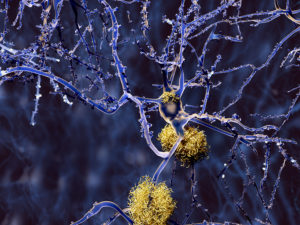A form of gene therapy has yielded positive findings in the search for a potential cure to Alzheimer’s disease, according to research published from the journal Proceedings of the National Academy of Sciences. Researchers in the United Kingdom from Imperial College London discovered that they were able to reduce the buildup of amyloid plaque in the brain cells of mice with early-stage Alzheimer’s by introducing a gene, known as PCGC1-alpha, into their brains. The delivery of this gene into their neurons was made possible by injecting a virus commonly used in gene therapy, known as a lentivirus vector. Based on this discovery, scientists b elieve that this form of gene therapy could be effective at slowing or halting the formation of a protein known as amyloid-beta peptide, which is a primary component of the amyloid plaques seen in those who have Alzheimer’s.
elieve that this form of gene therapy could be effective at slowing or halting the formation of a protein known as amyloid-beta peptide, which is a primary component of the amyloid plaques seen in those who have Alzheimer’s.
The mice in this study that had the PCGC-1 alpha gene injected into their brains all had early-stage Alzheimer’s, and had not yet developed amyloid plaques. After four months of receiving this treatment, a battery of tests revealed that these mice had few amyloid plaques, better memory and no loss of neurons in the hippocampus region of the brain. Over this same four-month period, the mice in this study that had not received this gene therapy treatment continued to develop amyloid plaques in their brains, resulting in poorer memory and the loss of brain cells. Additionally, the group of mice treated with the PCGC-1 alpha gene had less glial cells in their brains, which are thought to harm cells by releasing toxic inflammatory compounds.
Looking to the future, the study investigators hope that these positive findings can result in a new treatment strategy that prevents or stops the progression of early-stage Alzheimer’s disease. Further research into this gene therapy treatment is expected over the coming years.
Interested in learning more about Alzheimer’s research? Please call 561-296-3824. The Premiere Research Institute in West Palm Beach regularly conducts clinical research studies in the field of Alzheimer’s Disease. To find out more about these studies click here or sign up for their newsletter to keep informed about the newest treatments, articles, and research that are being conducted in the field of Alzheimer’s.
References:
Brazier, Y. (2016, October 11). “Gene therapy could prevent Alzheimer’s, study suggests.” Medical News Today. Retrieved from http://www.medicalnewstoday.com/articles/313412.php.
PPARγ-coactivator-1α gene transfer reduces neuronal loss and amyloid-β generation by reducing β-secretase in an Alzheimer’s disease model, Loukia Katsouri et al., Proceedings of the National Academy of Sciences, doi: 10.1073/pnas.1606171113, published 10 October 2016.
